- Home
- Howard Jacobson
The Making of Henry
The Making of Henry Read online
Table of Contents
Title Page
Dedication
Epigraph
Praise
ONE
TWO
THREE
FOUR
FIVE
SIX
SEVEN
EIGHT
NINE
TEN
ELEVEN
TWELVE
THIRTEEN
FOURTEEN
FIFTEEN
About the Author
ALSO BY HOWARD JACOBSON
Copyright Page
For Jenny . . . speaking of love
Huffy Henry hid the day
– John Berryman, 77 Dream Songs
Honour thy father and thy mother Exodus 20:12
Acclaim for Howard Jacobson and The Making of Henry
“A writer who can make you laugh out loud on the bus. . . . Jacobson conjures up a tale that combines sexual comedy with the kind of expansive intelligence prized by the Booker judges.” —The Observer (London)
“Jacobson is one of Britain’s best postwar writers. He’s well known as a funny writer, but that undersells him. There’s a dark side to his comedy, so dark that only comedy can deal with it.” —The Independent (London)
“Jacobson’s . . . exuberant prose and Swiftian rage cause considerable collateral damage along the way.”—The Sunday Times (London)
“[Jacobson is] by some distance, the cleverest, funniest, sharpest writer we have.”—The Sunday Telegraph (London)
“Yes, it’s true what they say about the Jacobson sense of humor. After the first couple of pages . . . you become certain that he can hone any sentence for maximum drollery, and that he’ll find exactly the right word on every occasion.” —The Daily Express
“Jacobson breathes vivid life into his characters, capturing their speech patterns exactly while describing their clothes, habitats, children, friends, food, and drink. All this is brought into sharp relief by his sardonic gift for creating the very believable and very funny situations in which his characters find themselves trapped.”—Daily Mail
“This is masterly writing; the language under tight control. . . . Monstrously funny.”—The Independent (London)
“Jacobson’s writing is as luscious and funny as ever. . . . You’re never far from comic brilliance.”—The Daily Telegraph (London)
“This is a terrific novel, full of pert observations and salty insights into the ageing process—not just Henry’s but the world ’s. . . . Jacobson is at the top of this form.”—Evening Standard
“A beautifully rounded portrait of a man gazing into the prism of the past in order to see the future. . . . A touching, picturesque tale . . . seriously funny.”—The Sunday Telegraph (London)
“Painfully funny.” —The Sunday Times (London)
“Jacobson at his best. . . . Henry Nagel is a fantastic creation—one of the smartest, most interesting, most complex failures in modern literature.” — Jewish Chronicle
“The writing, while far too clever to descend into farce, is stuffed with brilliant hilarity. . . . [Henry Nagel]’s imagined conversations with his deceased father are comic and richly sophisticated, as all Henry’s conversations are, whether with dead parents or living lovers and neighbors.” — The Spectator
“It could be that Jacobson’s true achievement is to take on the mantle of our foremost comic complainant, in the great tradition of Kingsley Amis and Evelyn Waugh. There is no greater curmudgeon writing in English today.” —The Guardian (London)
ONE
Henry believes he knows exactly when the ninety-four-year-old woman in the neighbouring apartment dies. He hears her turn off. Until now he has not been able to distinguish her from her appliances – her washing machine, her vacuum cleaner, her radiators, her television. But the moment she gives up the ghost he detects the cessation of a noise of which he was not previously aware. A hum, was it? A whirr? Impossible to say. There is no word for the sound a life makes.
‘Ah well,’ his cleaning woman muses, once word of the death has seeped out, ‘what’s one more?’
‘Plenty, if you happen to be the one,’ Henry says.
She sidles a walled Irish eye towards his, oblivious to an Englishman’s partiality for space between two people not connected by marriage.
‘There we are, then,’ she says with a shrug, and goes on with the dusting. They’re all shrugging and dusting round here. Not on edge exactly, but fatalistic. Waiting to be blown apart. Henry isn’t thinking like that, though; Henry is just waiting for himself to die. There’s a subtle political difference. Never mind poison gas in the Underground, never mind helicopters crop-dusting the city with anthrax, Henry sees what’s coming as an entirely personal catastrophe, something between him and his Maker and no one else. That’s always been the trouble with Henry – he has never been able to grasp the larger picture.
Rather than remain in his apartment while there is a corpse next door, Henry ventures out. This is not something Henry normally enjoys doing. Nothing to do with anthrax. Out, in Henry’s view, is a madhouse. Historians of social lunacy will confirm that this is literally the case, that the mad have been let out of the asylums and allowed to walk the streets. But Henry doesn’t mean that. By mad, nerve-strung Henry means revving when you’re stationary and driving with your hand on your horn – read that sexually if you like, but Henry has in mind incessant honking – he means text messaging the person standing next to you, or being wired up so that you can speak into thin air, conversing with God is how it looks to Henry, or wearing running shoes when you’re not running, or coming up to Henry with a bad face and a dog on a piece of string and asking him for money. Why would Henry give someone with a bad face money? Because of the dog? Because of the string?
But there’s out and there’s out, and this out, Henry concedes, beats others he’s encountered. Still too much revving and honking and similar vehicular hectoring – inevitable, given the triple-parking which is the custom here: people nipping out of their cars to say hello to other people who have nipped out of their cars to say hello, and people boxed in by both sorts having heart attacks on their horns – but it’s a superior sort of hectoring, and the sports clothes, especially on the elderly, bespeak a greater gentility too, more cricketing and yachting than footballing – due, presumably, to the proximity of Lord’s and the boating lake in Regent’s Park. As for the bad-faced men with dogs, they rarely venture this far into the comfort zones of NW8. Neither did Henry much before now. Henry isn’t from here. As aren’t many of the people he sees in the street or bumps into in the lift, which accounts for much of the appeal the place has for him. It’s better to be a stranger among strangers, Henry reckons, no matter how jumpy everyone is, than to be even partially at home among the indigenous.
Prior to NW8, Henry had lived postcodeless and with the semi-permanent headache of the never quite settled anywhere, with one dry foot on the cobblestones of the town and one wet one in the drains and delfs of a moor so dour it was a miracle a single flower could find the will to bloom there, and few did. Walkers came and marvelled, but walkers are only ever passing through. As for the natives, Henry’s explanation to visitors to his rented crofter’s cottage was that they looked the way they did – blunt-nosed, crook-backed, mole-blind – as a consequence of never having moved from here since around about the end of the ice age, or whenever it was the great muds came. ‘Their heads grew beneath their shoulders as a matter of adaptational imperative,’ Henry went on, ‘and they’ve never been able to find a way of prising them out since.’ Assuming this to be a complaint about his environment, the less subtle of Henry’s visitors wondered what, in that case, he was doing living in a cold-water cottage by a delf. What did he exp
ect, for God’s sake? At which Henry opened his eyes wide. He did not like people to talk ill of his heartlands. Ever since he could remember, Henry had woken up to a view fringed like an eyelash by the Pennines. The Pennines were his Mountains of Mourne. He attached lyrical significance to their green and purple. They were his Alps. They extended his conception of the possible. They were all foreignness and promise.
He should have stuck with the view. Down here, Henry is happier – which tells you something, since he isn’t happy – or at least he is more at home being not at home. But he hasn’t been here long. And wouldn’t be here at all if he still had his job, or his youth, or someone to love. And if it weren’t for the accident of a luxurious southern apartment – the one that has the dead old lady lying next door – passing into his possession.
The luxurious apartment is another reason why Henry would rather be in than out. Crystal chandelier over his bed, sunken bath, electronic drapes – press the keypad and the lights go on, the bath fills and the curtain closes – Henry has never lived so graciously before. The sound system is so good he cannot locate the speakers, he just gets music wherever he goes. A white bare-breasted mermaid, Saudi Arabian in conception, conceals the lavatory cistern, promising to press herself against him when he sits. She has a plastic plug in each of her nipples, from which, Henry initially deduced, fountains must play, though why you would want fountains playing down the back of your neck when you visit the lavatory, Henry had no idea. In the end he worked out that the plugs were simply to protect the nipples when the seat went up. But he is still feeling his way round the place and hasn’t given up finding fountains yet.
How it is that the apartment has passed into his possession Henry can explain, it’s the why that’s the problem. Because there’s a God, that’s why, would be Henry’s best shot, or at least his second-best shot at an explanation. Unless there’s a devil and NW8 is earmarked for destruction. The how is much easier. An envelope popped through the letterbox of his moor-land cottage, that’s how, just as he was considering his future, its contents a life-tenancy agreement with his name on – he takes it to be a life tenancy anyway, though he can’t be trusted to comprehend any piece of writing which isn’t what his profession calls ‘imaginative’ – and a letter from Shapira and Mankowicz, Solicitors, outlining the terms of the gift, to wit an obligation, as per the enclosed lease, to make no noise, to house no pets, to let off no firearms, and otherwise to ask no questions, in return for which he can expect to live unhampered and be told no lies. Henry doesn’t think it’s a mistake, Henry believes he can discern a bit of logic in it, but just in case he’s wrong, just in case someone else’s name should be on the lease, another Henry Nagel even more deserving than he is, he means to enjoy his good fortune before it’s taken away from him again. Like life itself.
Not that Henry wants much more from the inside than he expects from the out. He doesn’t riot in the sunken bath, or go to sleep with the chandeliers ablaze. Mainly he potters about in a kimono (an affectation), makes tea in a samovar (another affectation – but then it’s all affectation in the twenty-first century, doing anything that isn’t slobbing about in running shoes with writing on them is affectation) and searches for peace in his heart. He likes it that he can see London from any of his windows, Regent’s Park, the Zoo, the Mosque, Lord’s Cricket Ground, the towers of the City. Better than the hills, all that. It means that life is out there if you want it, which Henry doesn’t, but he is grateful for being given the choice. You need life to be out there if you are going to find peace in your heart.
‘My husband reckons they’ll bomb the City first,’ his cleaning lady has observed, leaving it as read that Henry’s apartment will be a good place to watch it burn from. Henry even wonders if she’s fishing for an invitation to come round with her husband when it happens. But this isn’t the peace in your heart Henry is talking about. Henry is thinking about himself. He would just like to feel right, for once, vis-à-vis the rest of the world.
The other thing Henry wishes to stay in and do is take his father to task. Who am I? Who are you? Do you love me? Am I a disappointment to you? Don’t you want to know whether you’re a disappointment to me? Did you never care? Did you never feel bad? Do you ever feel bad now? About me? About Mum? About yourself?
All that.
Isn’t Henry a bit old for this routine? At his age, shouldn’t Henry be watching daytime television, or playing canasta with fellow irascibles, or doddering to the park with his grandchildren?
Probably yes. Probably very unhealthy doing what he’s doing. The trouble is, Henry has no children to give him grandchildren. And no friends disposed to lend him theirs. Henry has dishonoured his friendships, whether by disparaging his friends’ achievements, or by turning away from their society, or by borrowing their wives, and you know what friends are like when you start that.
So he has no one to play canasta with him either.
In fact, ‘borrowing their wives’ is at once rather too cute and rather too buccaneering a description of what Henry actually did, which was more in the nature of running himself down, looking soulful, and confessing to feelings of long-standing devotion which in truth he hadn’t known he’d felt until the moment of expressing them. Out of pity for which, or simply out of curiosity, yes, they on occasions borrowed him. Borrowed him, fucked him, and put him back. But as a man with reason to doubt his own ability to be at the active end of any verb, Henry glamorises the little devilishness of which, in his younger days, he was capable.
Either way, whoever borrowed whom, he still has no one to play canasta with him.
And, come to that, no father. Not living. But he had one once. Everyone who doesn’t have a father now must have had a father or heard tell of a father once. You can’t manage without the idea of a father. The idea of a father, especially the idea of rejecting a father, powers the modern world. And you can’t reject what you haven’t had.
For his part, Henry is just learning to talk to his.
Nothing fanciful. No ‘my father, methinks I see my father’, no crossing over, no table rapping. Elbows on the dark green banker’s desk which came with the apartment, chin in the chalice he makes for it with his too-tight hands, Henry silently delivers himself of his vexations while his father, dead for a decade, listens. It’s because he knows his father is only partially understanding – both in the sense of slow to comprehend and reluctant to sympathise – that Henry values his attention. He doesn’t want to be humoured. When they start humouring you it means you are headed for an early grave. Go on arguing and you might just live for ever.
That’s Henry’s father’s job – to see things differently and keep his son alive.
Always was. (Henry’s father, arguing the toss already.) Not something I was ever given credit for, but that always was my job. Who else was going to save the boy from drowning?
Drowning in what, Dad?
As though you don’t know. Drowning in women, drowning in books, drowning in sick notes, drowning in your own terrors . . .
As for why Henry wants to live for ever when he’s got no friends, got no one to love, and thinks life’s a madhouse – you might well wonder. But it’s in the nature of the machine not to want ever to be turned off. Ask the ninety-four-year-old woman in the apartment next to his. Just don’t expect a reply.
She has one mourner. Henry no sooner leaves his apartment than he walks into him in the corridor, standing, as though he’s just been sent out of class, with his hat covering his genitals. Showing respect for the dead while the people who do what needs doing to a body do it. He is also, it seems to Henry, surveying the condition of the paintwork.
Henry nods. ‘I’m so sorry,’ he says. Trips off the tongue now. Someone dead? So sorry. Used to be Henry’s father always saying sorry to the bereaved. Now the responsibility has passed to Henry. Good morning, so sorry . . .
The mourner is about Henry’s age, of an appearance which once – when older men were in vogue – would have be
en described as ‘dapper’. Fallen dapper. Gingery moustache, bounder’s eyebrows, jutting jaw, fag-stained teeth, bloodhound cheek pouches, apoplectic colouring. ‘Rotten luck,’ he makes Henry want to say.
‘Been expecting it some time,’ the mourner tells him.
‘Sorry, I didn’t realise,’ Henry says. ‘I knew she was elderly but I was under the impression she was hale.’
‘Hale enough to go on for another ninety years. But that doesn’t stop you expecting, does it?’
‘No, I don’t suppose it does,’ says Henry. Then, because more appears to be expected of him, he adds, ‘You the only child?’
‘Me? No fear. Just the stepson. My father’s folly, that one.’
Henry mishears. ‘Filly?’
‘Filly, folly, same difference. Could never see a woman, my old dad, without doing something stupid.’
Henry notices that the mourner has a way of letting his words die in his chest, as though everything is a damn cheek but there’s nothing to be done about it. Though whether that’s integral to the man or just a consequence of his bereavement, or a hurried breakfast, Henry has no idea. ‘My condolences anyway,’ Henry says, trying to hurry on.
The mourner offers his right hand, leaving the left holding the hat with which he covers his respectful genitals. ‘Lachlan,’ he says, spitting. ‘Lachlan Louis Stevenson.’
Tricky name to get your teeth round, but Henry thinks a man of Lachlan Louis Stevenson’s age should be able to speak his own name by now without spitting. But then you’d think Henry himself would have been spat at enough times in a long life not to be obsessed with the particle of food which has just landed on his sleeve. Hard, though, for Henry – always has been – to concentrate on anything a person who has just put food on his sleeve is saying. He stares, mesmerised, at it – the speck, the smut, the atom. Bad manners, but he has no choice. For the very reason that he shouldn’t be looking, look is all he can do.
Lachlan Louis Stevenson is telling him something about becoming a neighbour, about his plans to move directly into the old girl’s place, once she’s been removed. It’s his by right, apparently. Always has been.

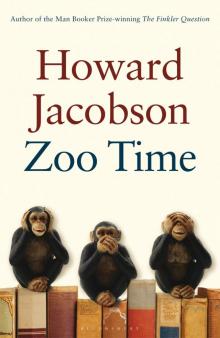 Zoo Time
Zoo Time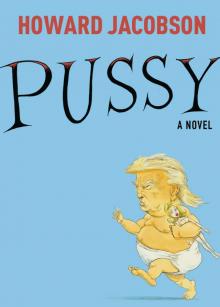 Pussy
Pussy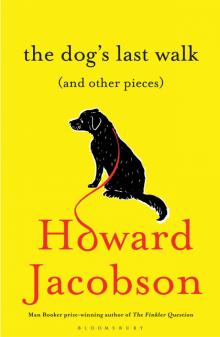 The Dog's Last Walk
The Dog's Last Walk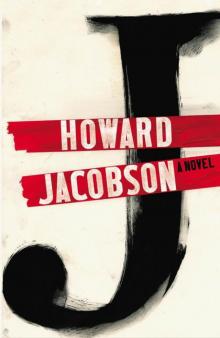 J
J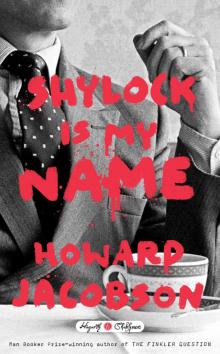 Shylock Is My Name
Shylock Is My Name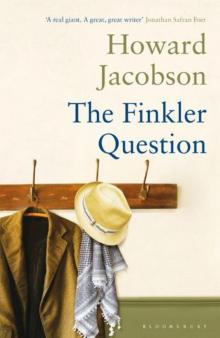 The Finkler Question
The Finkler Question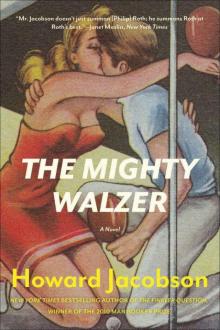 The Mighty Walzer
The Mighty Walzer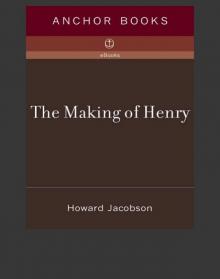 The Making of Henry
The Making of Henry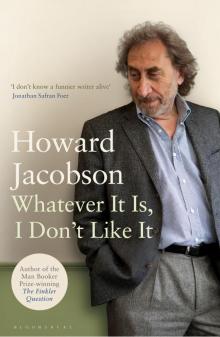 Whatever it is, I Don't Like it
Whatever it is, I Don't Like it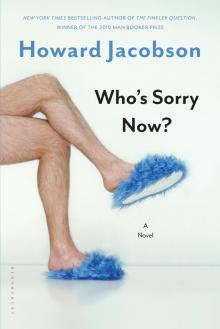 Who's Sorry Now?
Who's Sorry Now? Kalooki Nights
Kalooki Nights